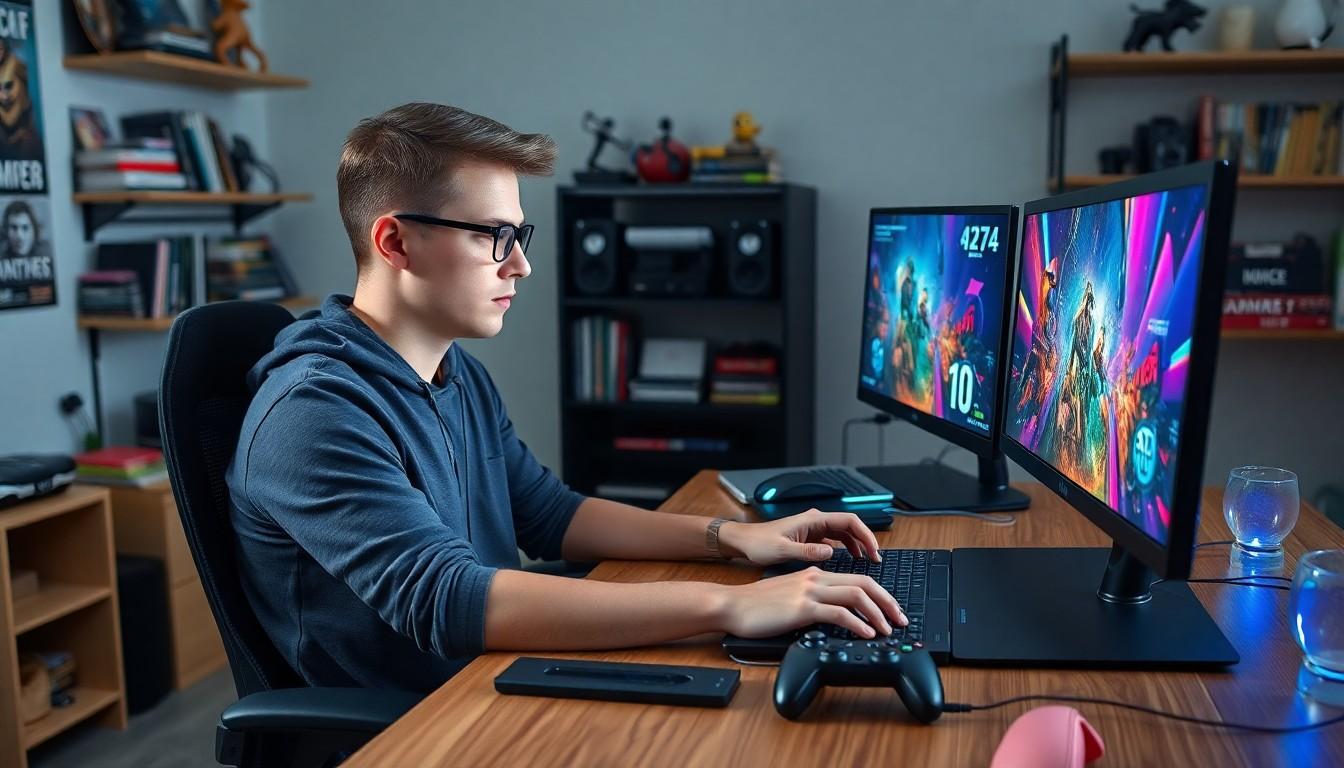In the fast-paced world of game development, choosing the right laptop can feel like picking a character class in an RPG—one wrong choice and you might find yourself in a pixelated pickle. Developers need powerful machines that can handle demanding software without breaking a sweat. After all, no one wants to watch their creative visions crash harder than a newbie gamer on their first boss fight.
From 3D modeling to coding, the right laptop can be the difference between a smooth experience and a frustrating one. With the right specs, developers can unleash their creativity and bring their wildest ideas to life. So, whether you’re crafting epic adventures or pixel art masterpieces, let’s dive into what makes a laptop truly worthy of your game development quest.
Laptop For Game Development
Selecting a high-quality laptop significantly impacts game development. Developers rely on laptops with robust specifications to efficiently run extensive software and game engines. Performance plays a crucial role; a more powerful laptop reduces build times and enhances the debugging experience.
Graphics capability is another essential factor. A laptop equipped with a strong graphics card enables developers to visualize their creations in detail. Smooth rendering of complex 3D graphics leads to a more accurate representation of game environments.
RAM also affects multitasking abilities. Ample RAM allows developers to run multiple applications simultaneously, including design software and coding environments. This capability boosts overall productivity and innovation.
Portability remains a vital consideration. Many developers work in different locations, and a lightweight laptop adds flexibility. On-the-go accessibility facilitates collaboration and brainstorming sessions with teams.
Battery life shouldn’t be overlooked. A laptop with a long-lasting battery ensures uninterrupted work hours, especially during travel. Consistent performance in various environments fosters creativity and efficient workflow.
Storage is essential for managing assets. A larger SSD provides quicker access to game resources, leading to improved loading times and operational speed. Fast storage options support an expansive library of assets and versions.
Compatibility with game development tools matters as well. Developers need a laptop that seamlessly integrates with industry-standard software. Effective collaboration hinges on smooth communication between hardware and applications.
Investing in the right laptop elevates the game development experience. A good machine provides the necessary tools to refine ideas, streamline processes, and build immersive experiences. High-quality hardware empowers developers to bring their creative visions to life.
Key Specifications To Consider
Selecting the right laptop for game development hinges on several key specifications. Understanding these will ensure developers can work efficiently and creatively.
Processor Performance
Processor performance dictates how smoothly development software runs. High-core count CPUs, such as Intel Core i7 or AMD Ryzen 7, excel at multitasking and reduce build times. Clock speed also matters; higher speeds translate to better performance. Look for processors with at least 4 cores and 3.0 GHz speeds for optimal efficiency. They manage demanding tasks, from compiling code to rendering graphics. A powerful processor ultimately enhances overall productivity and the development experience.
Graphics Card
The graphics card plays a crucial role in visual output and rendering. Dedicated GPUs, like NVIDIA GeForce RTX or AMD Radeon RX, handle demanding graphics tasks seamlessly. Such cards allow developers to visualize their work in real-time, which benefits game design and testing. Aim for a laptop that supports DirectX 12 and has at least 6 GB of VRAM for high-quality graphics performance. Strong graphics capabilities lead to smoother gameplay experiences and help bring creative visions to life.
Memory And Storage
Memory and storage affect a laptop’s capability for multitasking. A minimum of 16 GB of RAM is essential for handling multiple applications simultaneously without lag. Moreover, opting for an SSD improves loading speed and responsiveness. Large storage capacity, ideally 512 GB or more, ensures access to extensive game resources and files. Fast memory and ample storage streamline the development process, allowing developers to focus on creating innovative games.
Best Laptops For Game Development In 2023
Selecting the right laptop significantly impacts game development success. Here are some top recommendations for different budgets.
High-End Options
As a top-tier choice, the Razer Blade 15 stands out with its Intel Core i7 processor and NVIDIA GeForce RTX 3080 graphics card. It handles complex rendering seamlessly, making it ideal for resource-intensive tasks. Another premium option, the ASUS ROG Zephyrus G15, features a powerful AMD Ryzen 9 CPU and 32 GB of RAM, enabling smooth multitasking across various applications. These laptops also include high-refresh-rate displays, enhancing gameplay experiences for developers. Each model offers robust cooling systems, ensuring optimal performance during extended work sessions.
Mid-Range Choices
The Dell G15 provides an excellent balance of performance and affordability. With an Intel Core i7 processor and NVIDIA GeForce RTX 3050, it meets the demands of most game development software. Equally, the Acer Nitro 5 offers solid specs, including 16 GB of RAM and a 512 GB SSD, facilitating rapid loading times and efficient multitasking. Both laptops maintain good build quality and include decent battery life, allowing developers to work on the go. These mid-range options deliver sufficient power and features without breaking the bank.
Budget-Friendly Alternatives
For budget-conscious developers, the HP Pavilion Gaming Laptop presents an appealing choice. It includes an AMD Ryzen 5 CPU and an NVIDIA GTX 1650, providing basic graphics capabilities needed for game development. Another option is the Lenovo IdeaPad Gaming 3, featuring an AMD Ryzen 5 processor and 8 GB of RAM, suitable for indie game projects. While these options lack some premium features, they still handle essential tasks effectively. Both models prioritize portability and affordability, ensuring accessibility for aspiring developers in a competitive market.
Tips For Choosing The Right Laptop
Choosing a laptop for game development involves several key factors crucial for performance. Look for a high-performance processor, such as an Intel Core i7 or AMD Ryzen 7. These options provide the necessary speed for multitasking and reducing build times.
Consider the graphics card next. A dedicated GPU like NVIDIA GeForce RTX or AMD Radeon RX enhances visual output and rendering capabilities, which are vital for game development.
Evaluate RAM carefully. A minimum of 16 GB allows for smooth multitasking, especially when working with demanding software. Opt for models with 32 GB if the budget allows, as this adds extra flexibility for future needs.
Storage capacity also plays an important role. Choose laptops with at least 512 GB SSD to ensure quick access to game resources. Larger SSDs reduce loading times and provide ample space for projects.
Portability shouldn’t be overlooked. Lightweight models enable developers to work from various locations, facilitating collaboration. An ergonomic design adds to comfort during long development sessions.
Battery life is essential for uninterrupted work. Laptops that offer 8 hours or more of battery life prevent the disruption caused by constant charging.
Finally, check software compatibility. Ensure that the laptop meets the requirements of industry-standard development tools, which can vary by project.
Following these tips helps ensure a smart investment in a laptop tailored for game development, enhancing productivity and creativity on the journey to creating immersive games.
Selecting the right laptop for game development is crucial for any aspiring or seasoned developer. A powerful machine enhances creativity and productivity while enabling smooth multitasking and efficient debugging. By investing in a laptop with the right specifications developers can focus on bringing their innovative ideas to life without technical hindrances.
With numerous options available across various budgets developers can find a suitable laptop that meets their specific needs. Prioritizing performance portability and battery life will ensure a seamless development experience. Ultimately the right laptop not only supports the technical demands of game development but also fosters an environment where creativity can flourish.





